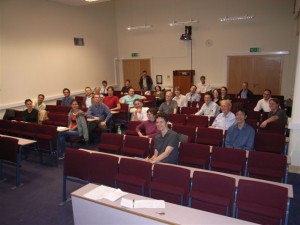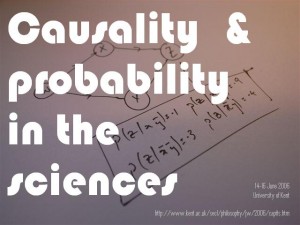14-16 June 2006
Keynes College Lecture Room 5, University of Kent, Canterbury, UK
(N6 on this map)
Introduction
Causal inference is perhaps the most important form of reasoning in the sciences. A panoply of disciplines, ranging from epidemiology to biology, from econometrics to physics, make use of probability and statistics to infer causal relationships. The social and health sciences analyse population-level data using statistical methods to infer average causal relations. In diagnosis of disease, probabilistic statements are based on population-level causal knowledge combined with knowledge of a particular person’s symptoms. For the physical sciences, the Salmon-Dowe account develops an analysis of causation based on the notion of process and interaction. In artificial intelligence, the development of graphical methods has lent impetus to a probabilistic analysis of causality. The biological sciences use probabilistic methods to look for evolutionary causes of the state of a current species and to look for genetic causal factors. This variegated situation raises at least two fundamental philosophical issues: about the relation between causality and probability, and about the interpretation of probability in causal analysis.
In this workshop we aim to bring philosophers and scientists together to discuss the relation between causality and probability, and the applications of these concepts within the sciences.
Example Questions
How is causality related to probability?
Which interpretations of probability best fit the uses of causality in the sciences?
Do different sciences demand different notions of causality and probability?
How are causality and probability employed in scientific models?
Which formalisms for causal and probabilistic reasoning suit which sciences?
Does causal inference vary according to discipline?
Which case studies shed most light on the uses of causality and probability in the sciences?
How has causal inference changed over time?
Timetable
ProgrammeSubmitted talks: 20 mins + 10 mins questions Abstracts are available in the conference booklet. Wednesday 14th June
Thursday 15th June
Friday 16th June
|
Local Information
There are many hotels and guest houses within easy reach of the University. Consult Tourist information or Around Canterbury for general tourist information, and here for bargain hotel rates.
Internet access: to get internet access at the university (wireless access is limited), apply at Computing Service Reception (the fee is £10). Visitors from UK universities may be able to connect via Janet roaming. There is also an internet cafe in Canterbury.
Organisation
This conference is organised by Federica Russo and Jon Williamson as a part of the project: Causality and the interpretation of probability in the social and health sciences.
Acknowledgements
We are very grateful to the British Academy, the British Society for the Philosophy of Science, the Mind Association and the Kent Institute for Advanced Study in the Humanities for providing financial support.
 |
